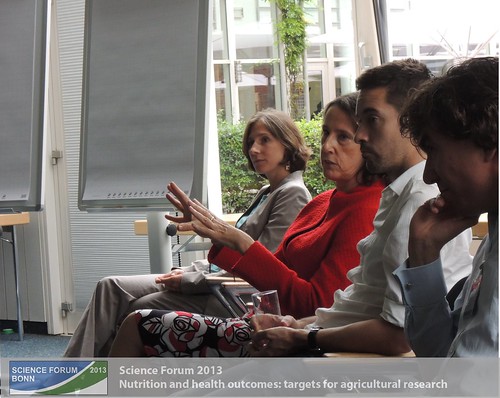Gender and Nutrition
Smaller and bigger – why does it matter?
Fri, 09/27/2013 - 23:34 — Louisa Wong
If a smallholder farmers in Central Africa earns an extra dollar, what kind of food would the farmer buy? The answer is - starchy staple food, fruits, meat and vegetables. If compared to a guy from a richer country like the United States, this guy would rather spend his extra dime on beverages and tobacco or dine out in a junky fast food chain to enjoy a cheeseburger with a diet coke. “The Afrint Project” is a study by from Lund University; Agnes D. was explaining in the Breakout session that her project team tries to find out the challenges faced by staple crop intensification in relation to farm sizes and urbanisation.
Bridging the gender gap
Thu, 09/26/2013 - 01:36 — Louisa Wong
According to the World Economic Forum (WEF) report, Lesotho is ranked first in Africa for bridging the gender gap and eighth in the entire world - with 95% of women able to read and write, compared with 83% of men. Women can take up important positions in the job market and can be as competitive as men. It’s only one side of the story.
 Lynn Brown was sharing her point of view about gender sensitive agriculture in the Breakout session about under-nutrition
Lynn Brown was sharing her point of view about gender sensitive agriculture in the Breakout session about under-nutrition
 Lynn Brown was sharing her point of view about gender sensitive agriculture in the Breakout session about under-nutrition
Lynn Brown was sharing her point of view about gender sensitive agriculture in the Breakout session about under-nutrition
Should Women Control the Household Finance? ---Support from the Academia
Wed, 09/25/2013 - 15:22 — Xi Zhao
Should women control the household finance? This is a hot topic among most families around the world, as well as a debate at Science Forum and Tropentag 2013. Scholars from different countries provide varied facts in rural areas and put academic results into practices.
Jemimah Njuki from CARE highlighted women played an important role in food production, ensuring adequate food, diverse diets and quality of food to the whole household. In general, women as primary care givers influence child nutrition directly through improved childcare practices, or indirectly through improvements in their own nutrition. Early studies showed, increasing women’s control over assets, mainly land, physical and financial assets, had positive effects on a number of important development outcomes for the household, including food security, child nutrition, and education, as well as women’s own well-being (Quisumbing 2003, Smith 2003; world bank 2001). In Bangladesh, a higher share of women’s assets is associated with better health outcomes for girls (Hallman 2000).
Gordon Prain, a Senior Scientist at the International Potato Centre, gave his opinion at Tropentag 2013 based on his field research in Kenya. He stated, in the agriculture system women are very important in the cultivation. If women do the job, they should control the finance resource . If women can decide which crops to grow, it would be beneficial to the children´s nutrition and the whole family.




